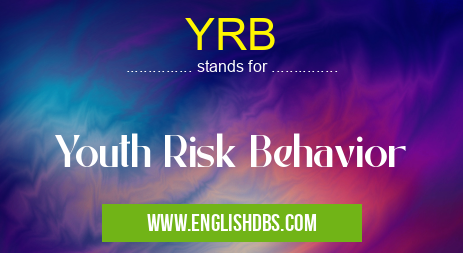What does YRB mean in YOUTH
Youth Risk Behavior (YRB) is an important term that adults need to be aware of when discussing the well-being and safety of adolescents. YRB is a concept that was created by the Centers for Disease Control and Prevention (CDC) to refer to any behavior or action that has the potential to lead to injury, illness, death, or long-term health consequences for adolescents. This includes behaviors such as drug and alcohol use, tobacco use, risky sexual behavior, poor diet, inadequate physical activity, and violent behavior. By being aware of YRB and taking proactive action to reduce its prevalence among teens and young adults, adults can help ensure their safety and well-being in the long run.

YRB meaning in Youth in Community
YRB mostly used in an acronym Youth in Category Community that means Youth Risk Behavior
Shorthand: YRB,
Full Form: Youth Risk Behavior
For more information of "Youth Risk Behavior", see the section below.
Why is Youth Risk Behavior Important?
Youth Risk Behaviors are particularly important for adults who care about young people's health and safety because they have direct effects on both physical and mental wellbeing. Research has documented a link between substance abuse during adolescence and increased likelihood of problems later on down the line including mental health disorders like depression, anxiety disorders like panic disorder, as well as social stressors like interpersonal violence. Furthermore, alcohol consumption during adolescence often correlates with increased risk factors like injuries due to reckless driving or high speed activities while under the influence. Therefore understanding YRB helps us understand how we can take steps towards reducing their prevalence among adolescents so that they can live healthy lives without putting themselves at unnecessary risk for harm.
Essential Questions and Answers on Youth Risk Behavior in "COMMUNITY»YOUTH"
What is the purpose of Youth Risk Behavior Surveillance System?
The purpose of the Youth Risk Behavior Surveillance System (YRBSS) is to monitor priority health-risk behaviors among youth and young adults ages 10-24 in the United States. This includes behaviors that contribute to unintentional injuries and violence, sexual behaviors leading to HIV infection, other sexually transmitted diseases, and pregnancy, alcohol and other drug use, tobacco use, unhealthy dietary behaviors, and inadequate physical activity.
How often is the YRBSS survey conducted?
The YRBSS conducts a national survey biennially (every two years). Some states and large local school districts may conduct their own YRBSS surveys annually.
What types of questions are asked on the survey?
The YRBSS survey covers a wide range of topics related to health risk behaviors that can affect youth health. These include questions on topics such as tobacco use, alcohol and drug use, sexual behavior, dietary habits, physical activity levels,access to health care services, mental health issues such as depression or anxiety as well as experiences with bullying or violence.
Who is responsible for collecting YRBSS data?
The Centers for Disease Control and Prevention's (CDC) Division of Adolescent and School Health (DASH) is responsible for coordinating the nationwide collection of data from participating sites each year.
How does CDC collect YRBSS data?
Participating sites are selected by CDC to collect data from middle schools and high schools using anonymous self-administered written questionnaires. Participants respond to questions regarding their age appropriate risk behaviors during the 12 months prior to being surveyed.
How is the data used?
Data collected by the YRBSS is used by state departments of health, education agencies, schools districts, community organizations and programs that work with adolescents in designing comprehensive school health programs; allocating resources; evaluating program effectiveness; advocating for policy change; directing prevention activities; creating targeted interventions; providing technical assistance; increasing public awareness; assisting with early detection efforts; developing public health messages on diverse topics like substance abuse prevention,tobacco cessation or nutrition promotion ;and identifying emerging trends in adolescent population group
Final Words:
In conclusion, youth risk behavior is an important term for any adult involved in adolescent welfare that should be taken seriously by parents/guardians/mentors/teachers etc., due to its potential impact on adolescent physical and mental wellbeing over time. By understanding which behaviors adolescents may be more likely than others to engage in which put them at higher risk for harm from injuries or illnesses — we can take proactive steps towards reducing those risks through education resources like talking openly about topics related to safe decision making or providing access to activities which promote healthy lifestyles such as sports teams/clubs etc.. In doing so we create better outcomes for our youth now instead of waiting until it's too late!
